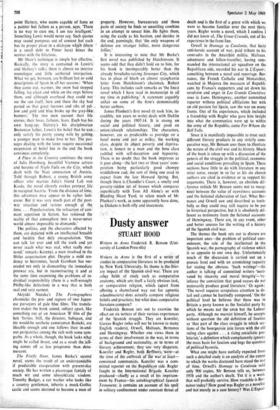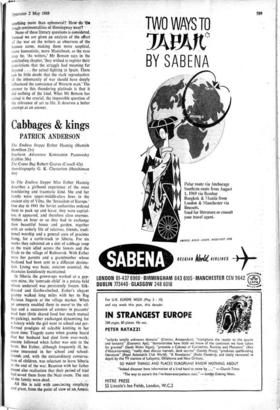Dusty answer
STUART HOOD
Writers in Arms Frederick R. Benson (Uni- versity of London Press 60s) Writers in Arms is the first of a -series of studies.in comparative literature to be produced by New YOrk-Oniversity, Its theme is_ the liter- ary impact of the Spanish civil -war: There are other fields of study such as comparative anatomy, which sets itself a fairly obvious tisk, or comparative religion, which '(apart from offering a shamefaced way out for agnostic schoolmasters) does actually. compare religious beliefs and practices; but what does comparative literature compare? - Frederick Benson sets out to examine the effect on six writers of their various experiences of the Spanish struggle. They are Koestler, Gustav Regler (who will not be known to many English readers), Orwell, Malcaux,' Bernanos and Hemingway. Whether one views them in terms of their involvement in the war, in terms of background and nationality, or- in terms of literary '-achievement, • theva+'e" Very .disparate. Koestler and .Regler, both &diners, 'were—at the time of the outbreak of ''the 'war-:at least— convinced communists. Koestler was a com- mitted reporter on the Republican side. Regler fought in the International Brigade. Koestler produced—chiefly as a result of his imprison- ment by Franco—his autobiographical Spanish Testament; it contains an account of his spell in solitary confinement under constant threat of death and is the first of a genre with which we were to become familiar over the next thirty years. Regler wrote a novel, which I confess I did not know of, The Great Crusade, out of his experience in the front line.
Orwell in Homage to Catalonia, that lucid anti-heroic account of war, paid tribute to his comrades in the Anarchist militia. Malraux, adventurer and fellow-traveller, having com- manded the international air squadron on the Republican side, recorded his war in L'Espoir: something between a novel and reportage. Ber- nanos, the French Catholic and Monarchist, watched in Majorca the massacre of Republi- cans by Franco's supporters and set down •his revulsion and anger in Les Grands Cimetieres sous la Lune. Hemingway, another committed reporter without political affiliations but with an old passion for Spain, saw the war on many fronts. Out of his experiences, which included a friendship with Regler who gave him insight into what the communists were up to within the army of the Republic; came' For Whom the .Bell Tolls.
Since it is manifestly impossible to treat such different literary products in any strictly com- parative way, Mr Benson uses them to illustrate the nature of the civil war and its history. Much of the book is taken up with a discussion of the genesis of the struggle in the political, economic and social conditions prevailing in Spain. These sections have little to do with literature in any strict sense, except in so far as his six chosen authors are cited in evidence or to support his arguments. There is, however, an absolute dif- ...ference (which Mr Benson seems not to recog- nise) between the value of eyewitness accounts and the fictional elaboration of fact. What Ber- nanos and Orwell saw and described as truth- fully as they could may still require to be put in historical perspective, but- it is absolutely dif- ferent as testimony from the fictional accounts of Hemingway. There are, in any event, other and better sources for the writing of a history of the Spanish civil war.
The themes the book sets out to discuss are important ones—the problem of political Com- mitment, the role of the intellectual in-the Spanish war, the pornography of violence which is so apposite to our own day. Unfortunately much of the discussion 'is carried out 'on a prosaic -level and with an astonishing-capacity for stating' the obvious. 'Such writings'—the author is talking of committed writers 'moti- vated by sincerity and moral integrity'—`re- inforce the conviction that good causes do not necessarily produce good literature.' Or again: `The novel requires scrupulous attention 'to de- tail and cannot be hurriedly composed.' On the political level he believes that' there was in Britain a party known as the Socialist party by which he means not the SPGB but the Labour party. Although no marxist himself, he accepts without question the old definition of fascism as 'that part of the class struggle in which sec- tions of the bourgeoisie join forces with the old ruling class against . . . a rising socialistic pro- letariat,' a definition which complacently ignores the mass basis for fascism and begs the question of political hysteria. 'What one might have usefully expected from such a detailed study is an analysis of the extent to which the works discussed have stood the test of time. Orwell's Homage to Catalonia sold only 900 copies, Mr Benson tells us, between 1938 and the author's death. Yet it is a work that will probably survive. How readable is Ber- nanos today? How good was Regler as a novelist and not merely as a case history? Was L'Espoir anything more than ephemeral? How- do" ,126 tough sentimentalities of Hemingway wear?
None of these literary questions is considered. Instead we are given an analysis of the effect of the war on the writers as observers of the human scene, making them more sceptical, more humanistic, more Manichean, as the ease may be. 'As writers,' Mr Benson says in the concluding chapter, 'they wished to register their convictions that the struggle had meaning -far beyond . . . the actual fighting in Spain. There can be little doubt that the stark reproduction of the inhumanity of war should have deeply influenced the conscience of Western man.' The answer to this thundering platitude is that it did nothing of the kind. What Mr Benson has raised is the crucial, the impossible question of the relevance of art to life. It deserves a better attemptat an answer.



































 Previous page
Previous page